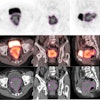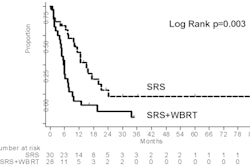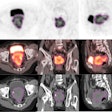Patients with brain metastases who survive for three or more years after stereotactic radiosurgery (SRS) should be monitored for delayed complications, according to an article in the January issue of the International Journal of Radiation Oncology, Biology, Physics.
Approximately 10% of survivors developed complications years later, wrote lead author Dr. Masaaki Yamamoto, from Katsuta Hospital Mito Gamma House in Hitachinaka, Japan, and colleagues.
Because the majority of patients with brain metastases have a short life expectancy, SRS tends to be administered for palliative care. In the current study, among a consecutive series of 2,000 patients who underwent Gamma Knife radiosurgery (Elekta) between 1991 and 2008, more than 90% died within a year of treatment. Only 167 survived for three years or more (Int J Radiat Oncol Biol Phys, January 1, 2012, Vol. 85:1, pp. 53-60).
The multi-institutional neurosurgery research team analyzed the medical records of these patients to determine the percentage who developed long-term complications, the nature of the complications, and whether there were predictive clinical factors. Seventeen of the patients (10.2%) experienced delayed complications that occurred two to 10 years following treatment, with a total of 18 lesions.
Large tumor volume was a predictive factor for complications, according to Yamamoto and colleagues. When cysts or enhanced mass lesions are identified in follow-up exams, timely surgical intervention may produce favorable outcomes for these patients, they wrote.



















